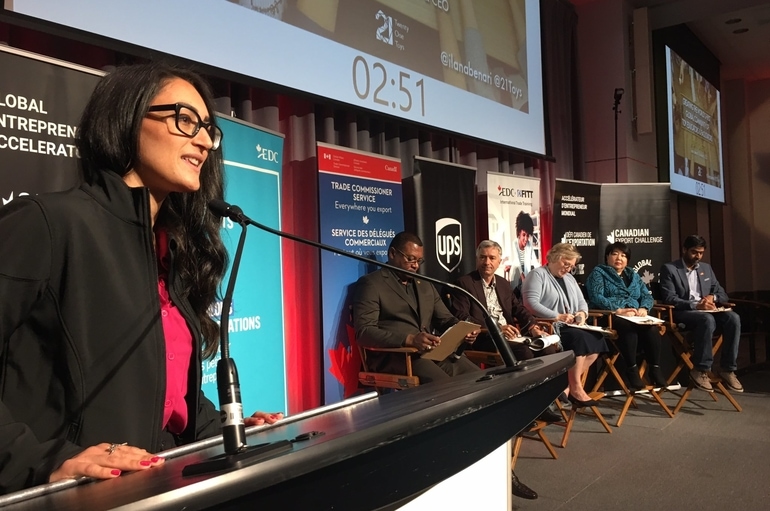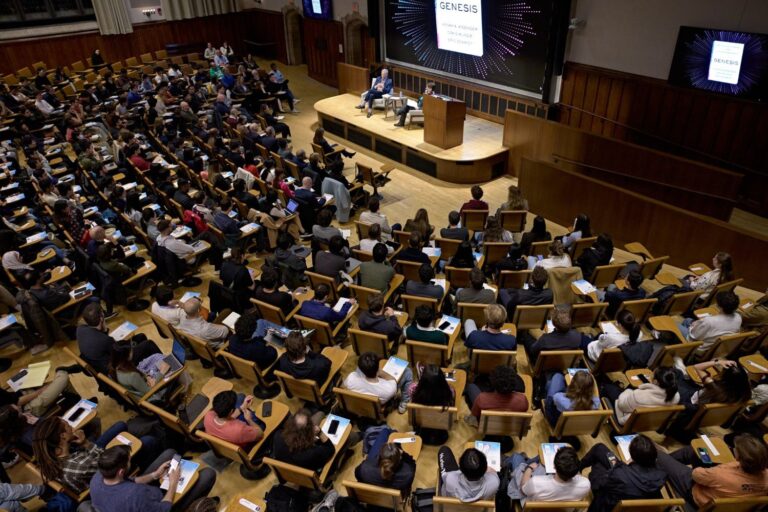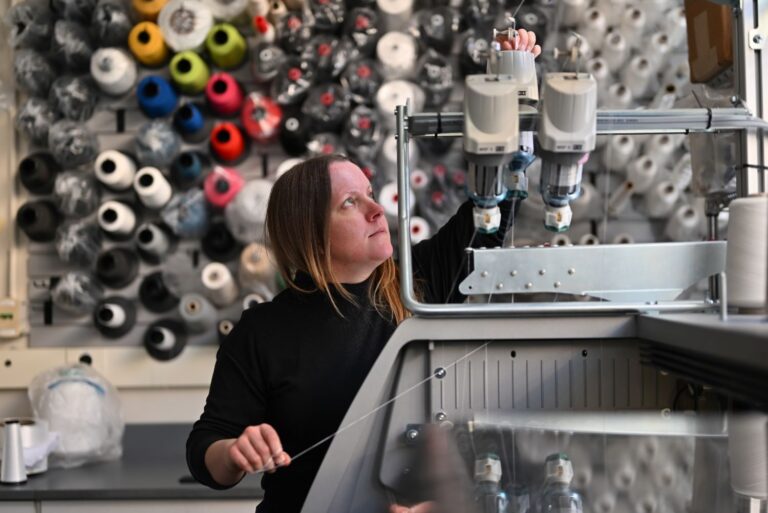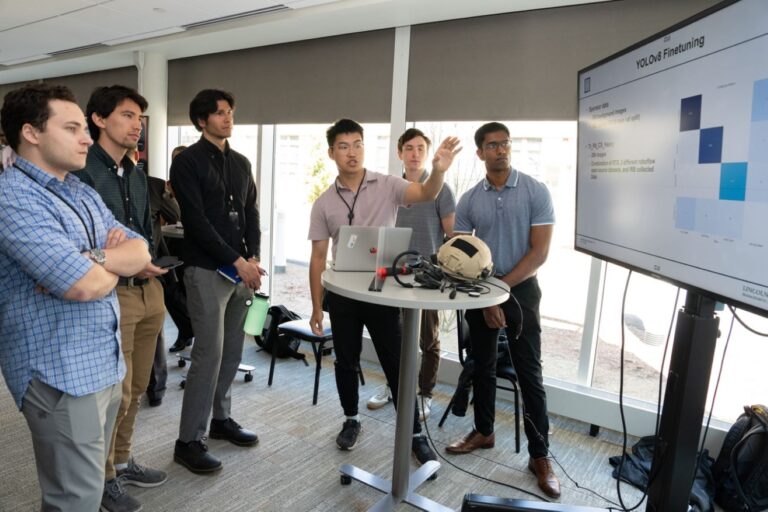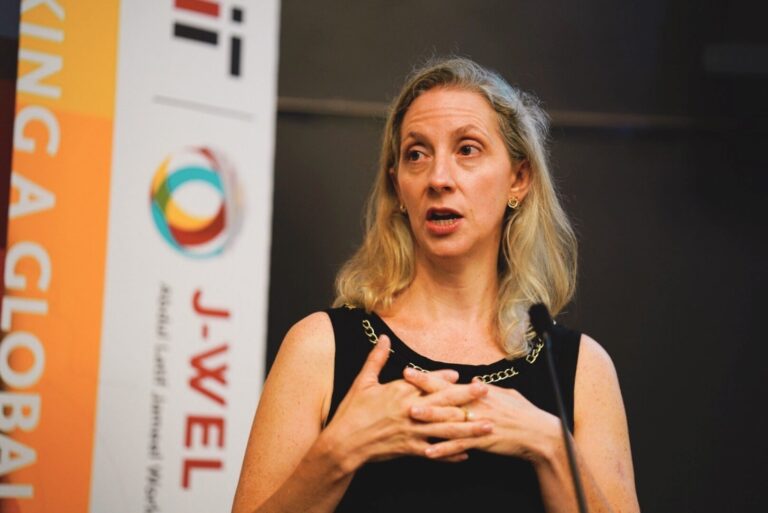How Ilana Ben-Ari’s Products Improve Creativity in over 1,000 Schools
Ilana Ben-Ari, Founder, CEO and Lead Designer at Twenty One Toys, envisions a world where toys can be used for social change. Her impressive list of accomplishments includes being a multi-award-winning product designer, TEDx speaker, Ariane de Rothschild Fellow, and winner of the SheEO Radical Generosity initiative. The vision for Twenty One Toys started when Ilana developed a toy centered around empathy for her university thesis project—it was originally intended to be a navigational tool for the blind. In 2012, that dream came to life in Twenty One Toys, her design company that lives at the intersection of design and social innovation.
The company’s first product is The Empathy Toy, a 3-D abstract puzzle that was originally designed with the Canadian National Institute for the Blind to bridge the communication gap between visually impaired students and their sighted classmates. It is now used as a tool for empathic learning and creative education for people of varying ages and abilities. Already in thousands of schools, homes, and offices worldwide, it was featured in TIME as one of six new technologies shaping classrooms and offices of the future. Her new product, The Failure Toy, challenges the notion that failure is something to be feared and hidden, and instead teaches us that failure is something that can be practiced and developed as a skill. Simply said, it’s a learning revolution.
Twenty One Toys’s Story: Kick Off from the Idea to Revolutionize School Learning

The story starts in a likely place for the origin of a learning revolution – in school. Around 2012, after quitting her day job, Ilana Ben-Ari took a dare – she believed that she could change education with toys, and she set out to prove it by founding Twenty One Toys.
Inspired by thought leaders like Sir Ken Robinson who claimed that schools kill creativity, Ilana believed that toys could bring creativity back to life in students. She believed that toys could be the new textbooks. Because toys can teach what textbooks cannot: creativity, collaboration, and most importantly – empathy.
“Toys are the new textbooks” says designer and social entrepreneur Ilana Ben-Ari. “If we’re going to be ready for the challenges and opportunities of the 21st century, we need to value play and emotional intelligence, in our schools and our offices.” As her first creation -The Empathy Toy, an award-winning toy being used in over 1,000 schools and companies that teaches communication, collaboration, and creativity.
What Is the Empathy Toy and Why Educators Love It?
As a hard-working student herself, very soon Ben-Ari has discovered being good at school had very little to do with being good at life or work. For that reason, the founder decides to cover that flaw by bringing life lessons into school projects, which later could be a foundation for the students. And since automation and AI or intelligent machines are going to be huge for the future of work, when we look at the top skills now, it is all about creativity, social and emotional learning that is vital, for which vision Ben-Ari came up with “Empathy” as the root of her work.

How does “Empathy Toy” work? Each toy piece has a different shape and texture. One player starts with a pattern of assembled puzzle pieces, and everyone works together to recreate the same shape with the matching pieces, however, with blindfolds. In general, it is a blindfolded puzzle game that can only be solved when players learn to understand each other which is “really challenging but rewarding at the same time” said Ben-Ari as she believes this is the innovation educators need for their teaching in the upcoming decades.
However, it finally works, Empathy Toy have proved its practices. Eventually, Twenty One Toys made its first sale to a school board in Ontario, Canada. One month later Twenty One Toys received a purchase order large enough to pay for their first production run of the Empathy Toy, and later with many more awards in the States as well as funds to help raise this learning revolution. That is where Ilana Ben-Ari has earned more confidence and inspiration to move on to her next game-changing products “The Failure Toy”.
Ben-Aria’s Sharing: From a Designer to an Entrepreneur
“After working in the world of design I realized it had a lot more to offer social sector, and since I did not really find an organization that I thought really did that, well, I thought it’s time maybe I’ll start my own business” claimed Ilana Ben-Ari the founder of first-of-its-kind Twenty First Toys.
The Changing Moment and Entrepreneurship
Shared on her latest interview, as a design student Ben-Ari has always had a passion to understand the role of design in social innovation and make positive changes for the community. After graduate, with her brainchild the Empathy Toy, Ben-Ari decided to take a big leap – to become a business owner. At first, Ilana had no idea what was involved in starting a company, so she started taking night classes, researching, and meeting with other entrepreneurs. Later around 2011, as working for a design company called Design Against Crime gave her the idea on how to run a design agency. And that is it! In 2012, Twenty One Toys is founded.

Despite a lack of experience in the business world, she said she felt herself was the best person to represent and promote her own product and vision.
“I didn’t think of myself as an entrepreneur for a while,” she said. “I started my business as a designer trying to get my own toy out there. I’ve learned since then that most entrepreneurs didn’t study business, they’re just very, very passionate about an issue.”
However, “deciding to start the company was one thing, but realizing that it was working was another” – shared Ben-Ari. In her point of view, entrepreneurship is risk-taking – “it was like a series of escalating dares”, like entering something that has no definite, with risks involved, both financially and emotionally and to be resilient to deal with failure is the core skill needed. Especially, when asked about innovation, to others it means completely turning everything upside down and changing everything. Yet, in Ben-Ari’s vision, innovations are come from small aspects of life.
“I’ve seen workplaces completely transformed if you just change where the coffee is and food because what that ends up doing is it creates a space for people from all over the department to sit down and actually talk to each other about how their day is going. It can be about really, really small changes that can lead to some pretty big innovations and you’re not going to be able to get there if you don’t create a culture that encourages that!”
What Are the Challenges Ben-Ari Is Facing as A Small Business Owner?

As an innovative design agent, Ben-Ari sees “focus” is the biggest challenge she and her firm is still trying to deal with. There are so many ways to work on a model and when to say “yes” or “no” is not an easy task. So, training programs is now her first move toward this problem, once a month for variety of people – from teacher to program coordinators or even directors in banks. She is trying to be as smart as possible to spread her message and prioritize the communities the company is supporting and reaching out to.
However, on a personal level the founder troubled with “when do I get to sleep?”, to Ben-Ari design is a perpetual work, it should always be completing and keep on changing for the best. And to address this challenge, Ben-Ari is developing a strong community of advisors and mentors, according to her, whose role is the crucial key for growing.
Inspiration or perspiration? Ben-Ari’s answer is both. It is important to draw inspiration personally and as a company. Even though perspiration or working hard is important, yet it always has to be with working smart along – stepping into a room and having the confidence to be okay without knowing everything and also having efficient processes in place. Humor, humility, curiosity and being a good person are all really important ingredients as well.
Ilana’s 3 Pearls of Wisdom for Future Entrepreneurs
- #1. Do not underestimate your power. Avoid underestimating your value.
- #2. Community is essential. Starting a business is incredibly difficult and all-consuming. It is important to have a strong community of support both personally and professionally.
- #3. Give yourself permission to succeed. Anyone can find the resources to follow their passion. You do not have to wait for anyone else to tell you that you can start!
The Bottom Lines
Twenty One Toys is a revolution in learning. Their goal is to become a company that uses toys for social change, and so far, it has received a lot of attention from educators to CEOs. Ben-Ari has done a great work creating new toys for a new century – where critical skills is more needed than ever.
After its first success, Twenty One Toys is on the verge of launching its brand-new toy: The Failure Toy. As we learn more from our failures than our successes, then why are people so afraid to fail? With this new design, Twenty One Toys’s intention is to break through the taboo of failure. It will challenge players to view failure as a ‘skill’ that can be practiced and honed rather something to be feared.

